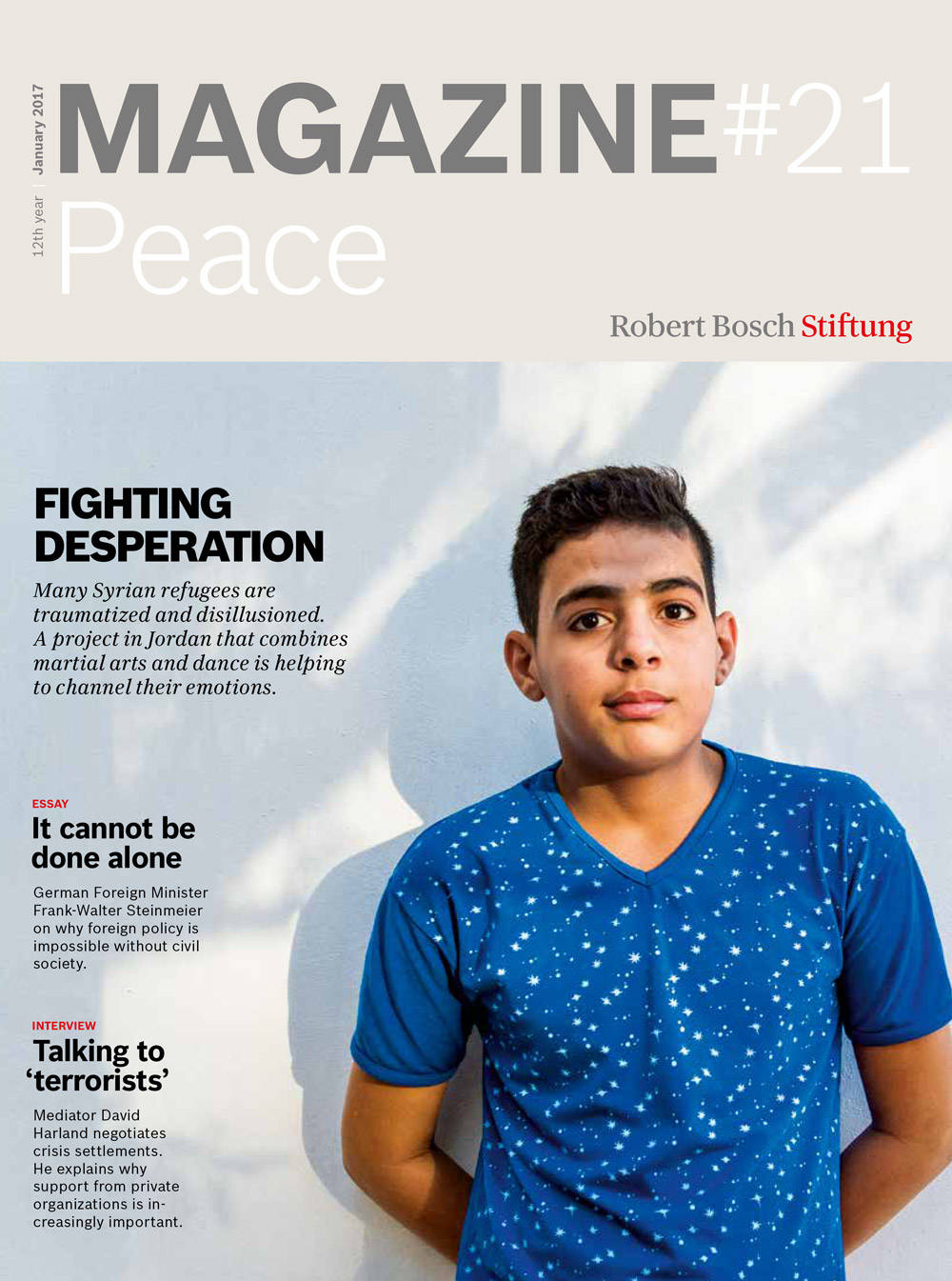PEACE
A glance at the new magazinePEACEWhat can a single person contribute to world peace?
Without these, no lasting peace can be achieved.
In this multimedia reportage we introduce you to people who commit themselves to a peaceful society in very different ways.
Capoeira4Refugees
THE DANCE OF LIBERATION
The organization "Capoeira4Refugees" was founded by a German-Syrian and trains children and young people in refugee camps and communities that house people from Jordan's war-torn neighbor, Syria.
Fear of bombs has long since given way to frustration about uncertain futures. That boredom can turn to aggression, particularly for teenagers and young men.
One of the children at Capoeira4Refugees is Ali. He fled Damascus with his families four years ago."If you’re just sitting around at home, you get aggressive," Ali says. "But if you do sport, like capoeira, you feel strong and confident."
"Children need something constant in their lives," says Martinez. "So that they become physically and mentally healthy adults."
Memory Lab
Remembering conflictsMEMORY GAPSEfforts to come to terms with the wars in former Yugoslavia are still in the early stages.
Participants on a study trip to Serbia look for answers – and a common memory.
On of the participants is Bosnian Mirsad Duratovic.
After the war ended, Duratović helped to rebuild his home village and locate mass graves, and buried hundreds of his compatriots in cemeteries. He now wants to erect a monument in Prijedor to the children killed in the war.
In his hometown of Prijedor, Mirsad Duratović is regarded as both a warrior and a diplomat – and is revered. "If you, with your history, can manage to talk to Serbs and call them your friends, then we can too," people often say to him.
More ProjectsBesides Capoeira4Refugees and the Memory Lab, these projects contribute to establishing trust and remembering conflicts.
Givat Haviva
AN ISLAND IN THE MADNESS
The campus of Givat Haviva is near Baqa, a small town in Wadi Ara, a valley between Tel Aviv and Haifa.Here, Jews live in kibbutzim privatized a long time ago, while many Arab Israelis live in densely populated villages. For ten years, wall and barbed wire have manifested the split identity of Baqa.
Part of the strategy of Givat Haviva is to engage the inhabitants of the village in a close network, whether at school, in their free time or for business – not live side by side in parallel worlds.
Givat Haviva developed a pilot project that aims to get more Arab women into work. As a side effect, a second income lifts families above the poverty line. At the moment, every second Arab family lives below it.
How Can You Develop A Shared Society?
Another Project and A World MapBesides Givat Haviva, we also support this project that shows how one can act in a conflict. The map shows how much this is needed.
Read the Magazine
Goto first pageMediation
THE MEDIATORDavid Harland dares to go to places that others gladly flee: As a mediator, the former UN diplomat negotiates crisis settlements and helps to resolve armed conflicts.
The mediators at the centre are called upon to assist by the belligerents or they approach them on their own accord if they believe a conflict is ready for negotiation.
UKRAINE CALLING
A training program for German representatives from politics, business, and civil society is helping to establish contacts within the country.
In September 2016, 15 participants travelled to Kiew to deepen their knowledge of Ukraine and advance their own projects.
"I understand much more about Ukraine now."
She has discovered that the widely held view of Ukraine as a divided country is actually inaccurate. "Ukraine is a hybrid society. Some people look towards Moscow while others adopt more of a European lifestyle."
And it's exactly this sort of knowledge about conditions in the country that is crucial for Reinke in setting up a human rights organisation.
Karte - Tote durch Konflikte weltweit 2015
caused by war and conflict in 2015
caused by war and conflict in 2015
caused by war and conflict in 2015
caused by war and conflict in 2015
caused by war and conflict in 2015
durch Krieg und Konflikt im Jahr 2015
caused by war and conflict in 2015
caused by war and conflict in 2015
caused by war and conflict in 2015
caused by war and conflict in 2015
caused by war and conflict in 2015
caused by war and conflict in 2015
caused by war and conflict in 2015
Mexico
1.652 deaths
caused by war and conflict in 2015
Ukraine
1.304
deaths
caused by war and conflict in 2015
Turkey
1.035
deaths
caused by war and conflict in 2015
Libya
1.482
deaths
caused by war and conflict in 2015
Pakistan
2.354
deaths
caused by war and conflict in 2015
Afghanistan
17.986 Tote
durch Krieg und Konflikt im Jahr 2015
Syria
52.933
deaths
caused by war and conflict in 2015
Nigeria
8.892
deaths
caused by war and conflict in 2015
Iraq
11.251
deaths
caused by war and conflict in 2015
Jemen
6.984
deaths
caused by war and conflict in 2015
Somalia
1.200
deaths
caused by war and conflict in 2015
Sudan
2.518
deaths
caused by war and conflict in 2015
South Sudan
7.457
deaths
caused by war and conflict in 2015

























 PEACE
PEACE
 Contents
Contents
 THE DANCE OF LIBERATION
THE DANCE OF LIBERATION





 MEMORY GAPS
MEMORY GAPS



 More Projects
More Projects
 AN ISLAND IN THE MADNESS
AN ISLAND IN THE MADNESS



 How Can You Develop A Shared Society?
How Can You Develop A Shared Society?

 Another Project and A World Map
Another Project and A World Map

 THE MEDIATOR
THE MEDIATOR

 UKRAINE CALLING
UKRAINE CALLING

 ASSESSING THE STATE OF PEACE AROUND THE WORLD
ASSESSING THE STATE OF PEACE AROUND THE WORLD
 SEE YOU YESTERDAY
SEE YOU YESTERDAY
